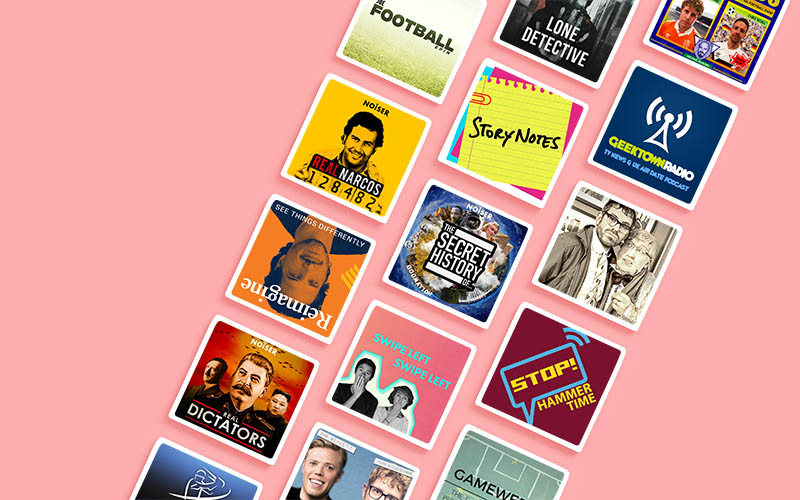Two audio production company heads have joined forces to launch an ad platform in the fast-maturing sector of UK podcasting.
Adelicious is the co-creation of David McGuire, a former BBC radio producer and founder of Bristol-based podcast production company Stabl, and Pascal Hughes, a TV director turned podcaster who has worked with the BBC, ITV, Five, National Geographic, The Economist, Netflix and Sky.
Hughes, now the CEO of podcast production company Noiser, had been making shows for television but said despite securing interviews with the likes of the CIA and White House officials in his career, lots of the content was “left on the cutting room floor”.
He explained to BusinessCloud that there was an appetite in the UK for well-produced shows which took a cue from the likes of Netflix’s non-fiction programming – a far cry from the chat and celebrity shows often found at the top of UK podcast charts.
His pivot to podcasts was a bet which has paid off. The company’s shows have accrued millions of listeners, and Hughes and team have creative freedom with “no commissioners above us”.
“There was no one else doing that in Britain,” he said of Noiser’s resulting history podcasts, including Real Narcos, Real Dictators and Lone Detective.
But with the new creative freedom came the challenge of monetisation. Hughes described an industry in which producers either have to find advertisers themselves or sign a 50-50 advertising contract which could last two years.
“That’s a long, long time in the industry,” he said.
Hughes wanted a company which based advertising on success and could connect brands and shows on a case-by-case basis.
Adelicious was formed alongside McGuire to connect the relatively small group of professional podcast producers and the pool of brands looking for access to their audiences.
‘Biggest in UK’
McGuire said their plans are to be “the biggest marketplace for podcast ads in the UK”.
Operating pre-launch since June, the co-founders said it was an organic progression after passing on ad opportunities to other shows, which they thought might be better suited elsewhere.
“I couldn’t find a company that does that without having to sign a huge contract,” said Hughes.
McGuire, whose firm Stabl has worked with big brands including Red Bull and Monzo, added: “As the industry has matured over the last two or three years, and companies like Noiser and Stabl have popped up with the means to make some money, suddenly you have a growth which is having to catch its tail”.
In the US, podcast revenue streams include lighter, more competitive contracts and entire platforms offering exclusive contracts, such as Luminary, which generate revenue from subscriptions, they explained.
McGuire said in the UK “producers are having to do absolutely everything without the capabilities to make money on their successes. It’s a really good time for us to do this because there’s a huge need for it and there’s really nothing else out there…”, Hughes added “…particularly in Britain, where there’s a big need for it.”
“We found it encouragingly easy to get started and fill that gap,” said McGuire.
Host-read ads
Host-read advertising, whereby the host reads ad copy during the episode, is a style of advertising found in some of the world’s biggest US podcasts, and its this style which Adelicious will necessitate.
“Brands love host-read,” said Hughes. “You have that intimacy level,” added McGuire. “You have that trust, and suddenly the price goes from £2-3 per thousand listeners to £30 or £35.”
Hughes said that the host-read ads also give podcast makers and hosts the choice of the ads they choose, and the option to blacklist certain topics.
Big brands, he said, are now starting to trust that this form of advertising pays off.
McGuire said: “Because it’s a much more intimate medium than radio, you want to associate your editorial with brands that align with you.”
As an example, McGuire said Adelicious has already facilitated a partnership between a mental health technology company and a successful podcast on therapy. The brands align, he said, and they can work together on editorial.
Automated future
While the co-founders are well-versed in the podcast industry, the world of tech is relatively new to them.
They said while the process is currently “hand-cranked”, investment has been made in web-developers to build out the platform.
“We want to gradually automate the process. We want to reduce of barriers it takes for independent producers to set up those deals,” said McGuire.
He said the plan for Adelicious is to become an automated marketplace in which brands can browse shows and audience figures, and producers can seal deals, generating paperwork and legal documents automatically.
“At the moment brands contact us, we have a direct relationship based on our reputation,” explained Hughes.
Dominating the market
McGuire added: “Without making too grand a statement, we would like to get to a place this year where we’ve got all the processes in place and we can prove the model.
“Next year we plan to scale and dominate the market. We can undercut and still make a good profit.”
Hughes said the firm plans to bring in more people and will use the deals already secured to provide the cashflow to start hiring.
The firm is currently working with around ten shows to provide advertising opportunities, and the welcome challenge is scaling up quick enough, said Hughes.
“At the moment we’re only letting in certain podcasts, to enable us to have big shows with a bespoke hand-picked service. At the moment we’re only able to do that with leading podcasts,” he said.
McGuire said that, as with all digital advertising, there has been a need to refine the audience data collected, and this has improved in the podcasting industry, where in earlier years there was almost none for advertisers to work from.
But with GDPR in effect in the UK, McGuire said that it’s difficult to get to the granular level of data that the likes of social platforms hold on their users.
Hughes said that the brands they are working with are happy with the audience data they provide – which dependent on the podcast platform can include gender, age-group and geography.
“It’s still not Facebook-level,” said McGuire, “but we’ve reached a point where the data is good enough. There is no doubt that podcasting advertising works.
“When we first started this, the conversation was around what a podcast is. Now it’s about how much money is needed.”

